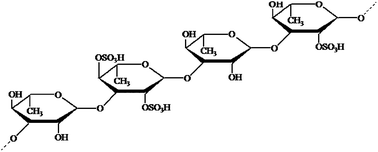Fucoidan from the sea cucumber Acaudina molpadioides exhibits anti-adipogenic activity by modulating the Wnt/β-catenin pathway and down-regulating the SREBP-1c expression
Abstract
A novel fucoidan, which consists of a 1 → 3-linked tetrafucose repeating unit that is distinctive in its sulphation pattern, was isolated from the sea cucumber Acaudina molpadioides. In the present study, we examined the anti-adipogenic effect of the fucoidan from Acaudina molpadioides (Am-FUC) in vitro and in vivo. Results showed that Am-FUC exhibited an inhibitory effect on the proliferation and differentiation of 3T3-L1 cells. Am-FUC suppressed the differentiation of 3T3-L1 cells, decreasing the content of intracellular triglyceride by 34.07% at the concentration of 200 μg ml−1. In vivo experiments showed that the subcutaneous, perirenal and epididymal fat content of Am-FUC-treated mice were significantly reduced compared to the HFFD-fed mice. A reverse transcriptase-polymerase chain reaction assay revealed that Am-FUC significantly increased the mRNA expressions of Wnt/β-catenin pathway related factors, namely, Wnt10b, β-catenin, Fz and LRP5, and decreased that of the key transcriptional factors, such as SREBP-1c, PPARγ and C/EBPα. β-Catenin acts as an anti-adipogenic factor to inhibit the expression of PPARγ and C/EBPα, while SREBP-1c can promote the adipocyte differentiation by enhancing the activity of PPARγ. Western blotting results showed that Am-FUC significantly increased the protein level of the total β-catenin and nuclear β-catenin and suppressed that of the SREBP-1c. Am-FUC also significantly inhibited the mRNA expressions of the lipid synthesis related genes such as FAS and GPAT, while had no effect on that of the lipolysis related genes such as HSL and ATGL. These findings suggest that Am-FUC possesses marked anti-adipogenic activity by modulating the Wnt/β-catenin pathway and down-regulating the expression of SREBP-1c.


 Please wait while we load your content...
Please wait while we load your content...